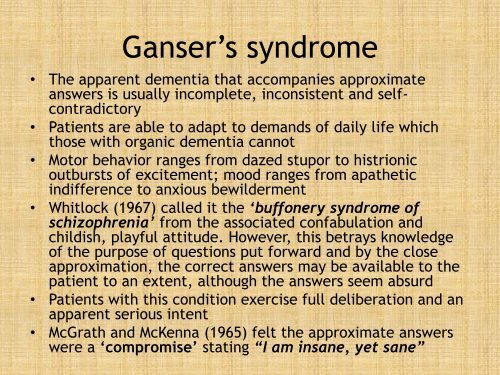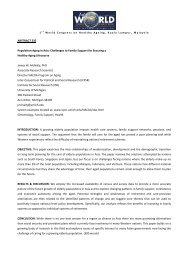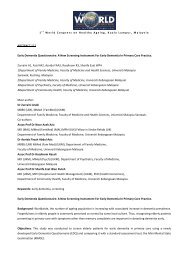The Pseudodementia Dilemma - 1st World Congress on Healthy ...
The Pseudodementia Dilemma - 1st World Congress on Healthy ...
The Pseudodementia Dilemma - 1st World Congress on Healthy ...
Create successful ePaper yourself
Turn your PDF publications into a flip-book with our unique Google optimized e-Paper software.
Ganser’s syndrome<br />
• <str<strong>on</strong>g>The</str<strong>on</strong>g> apparent dementia that accompanies approximate<br />
answers is usually incomplete, inc<strong>on</strong>sistent and selfc<strong>on</strong>tradictory<br />
• Patients are able to adapt to demands of daily life which<br />
those with organic dementia cannot<br />
• Motor behavior ranges from dazed stupor to histri<strong>on</strong>ic<br />
outbursts of excitement; mood ranges from apathetic<br />
indifference to anxious bewilderment<br />
• Whitlock (1967) called it the ‘buff<strong>on</strong>ery syndrome of<br />
schizophrenia’ from the associated c<strong>on</strong>fabulati<strong>on</strong> and<br />
childish, playful attitude. However, this betrays knowledge<br />
of the purpose of questi<strong>on</strong>s put forward and by the close<br />
approximati<strong>on</strong>, the correct answers may be available to the<br />
patient to an extent, although the answers seem absurd<br />
• Patients with this c<strong>on</strong>diti<strong>on</strong> exercise full deliberati<strong>on</strong> and an<br />
apparent serious intent<br />
• McGrath and McKenna (1965) felt the approximate answers<br />
were a ‘compromise’ stating “I am insane, yet sane”















